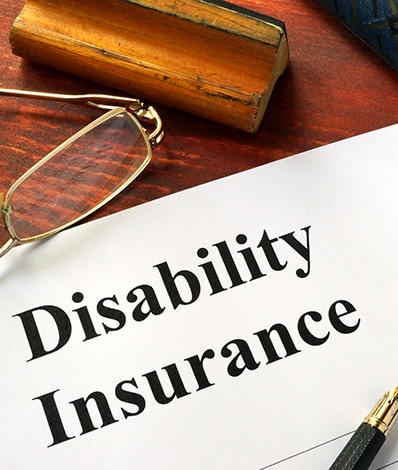Menu
New England Disability Lawyer – Social Security Disability Application & Appeals Process
Applying for Social Security disability benefits can be a daunting and difficult process for an individual suffering from a disability. The Social Security Administration is a large government agency with complex rules and guidelines that must be followed. Oftentimes, claimants unknowingly forego disability benefits because they are unaware of the rules and regulations. All too often, disabled individuals become overwhelmed and give up on their claim after a claim is denied due to issues such as necessary forms were not submitted or completed properly or medical records were missing from their file.
Attorney Rick Madore has an extensive amount of experience representing disabled individuals and he knows the rules and guidelines of the Social Security Administration very well. Rick has represented hundreds of SSDI claimants throughout Massachusetts, Rhode Island, Connecticut, New Hampshire, Vermont, and Maine. If you are suffering from a disability and need to apply for benefits or have recently been denied benefits, contact our office for a free no obligation review of your claim today.
The Social Security Administration Application & Appeals Process
Below you will find an overview of the application and appeals process of the Social Security Administration.
1. Original Claim
The first stage of the application process is known as the original claim. The original claim can be filed several different ways including through the internet, by telephone, by mail and at an in-person appointment at your local Social Security office. After the original claim is filed and processed, the claim is then sent to the Disability Determination Service (DDS), the state agency responsible for reviewing your claim and medical records and making a decision as to whether or not you suffer from a disability as defined by the Social Security Act. Once all of your medical records have been received and your file is complete, DDS makes a medical decision on your claim and sends the claim back to the Social Security Administration for final processing. If your claim is denied, you must file a Request for Reconsideration (SSA-561-U2) to appeal the denial.
2. Request for Reconsideration
After an original claim is denied, a request for reconsideration must be filed within 60 days of the date on the original claim denial notice, if special circumstances exist a claimant may be able to file an appeal beyond the 60 days as late with good cause shown. A request for reconsideration can be filed several different ways including through the internet, by telephone, by mail and at an in-person appointment at your local Social Security office. After the request for reconsideration is filed and processed, your claim is sent back to DDS so a new decision can be made as to whether or not you suffer from a disability as defined by the Social Security Act.
All the evidence that was submitted in the original claim and any new evidence submitted is reviewed. Once all of your updated medical records have been received and your file is complete, DDS makes a new medical decision on your claim and sends the claim back to the Social Security Administration for final processing. If your claim was denied, you must file a Request for a Hearing before an Administrative Law Judge (HA-501-U5) to appeal the denial.
3. Request for Hearing by Administrative Law Judge
Following a denial for reconsideration, a request for a hearing before an Administrative Law Judge must be filed within 60 days of the date on the reconsideration denial notice, if special circumstances exist a claimant may be able to file an appeal beyond the 60 days as late with good cause shown. A hearing request can be filed several different ways including through the internet, by telephone, by mail and at an in-person appointment at your local Social Security office.
After the hearing request is filed, the local Social Security office forwards your claim to the local hearing office. Hearing office personnel then process your claim and assign your claim to an Administrative Law Judge and a hearing date is then scheduled. Prior to your hearing, you will have the opportunity to review your file and submit any new evidence. At the hearing, you may be questioned by the Administrative Law Judge, a vocational expert, and by your attorney. You or your attorney will also have the opportunity to question the vocational expert and any witnesses. If the Administrative Law Judge denies your claim, you have the right to seek further appellate review by the Appeals Council and you must file a Request for Review of Hearing Decision/Order (HA-520) to appeal the denial.
4. Appeals Council Review
If you disagree with the Administrative Law Judge’s decision, you have the right to request further appellate review by the Appeals Council. You must file a Request for Review of Hearing Decision/Order within 60 days of the date on the hearing decision, if special circumstances exist a claimant may be able to file an appeal beyond the 60 days as late with good cause shown. A request for Appeals Council review can be filed several different ways including through the internet, by telephone, by mail and at an in-person appointment at your local Social Security office.
Once your appeal is received by the Appeals Council, the complete file is reviewed by an Administrative Appeals Judge. The Administrative Appeals Judge can affirm, change, or reverse the Administrative Law Judge’s decision and can also choose not to review your appeal at all. The Administrative Appeals Judge can also remand the case back to the Administrative Law Judge and request that another hearing be held so another hearing decision can be made. If you do not agree with the Appeals Council decision, you have the right to seek further appellate review by filing a civil lawsuit in Federal District Court.
5. Federal Court Review
If you disagree with the Appeals Council decision, you have the right to file a lawsuit in Federal District Court and have the decision reviewed by a Federal District Court Judge. You must file a lawsuit within 60 days of the date on the Appeals Council’s decision.
Contact an Experienced New England Social Security Disability Lawyer to Learn More
The Social Security Disability application and appeals processes can be overwhelming but you do not have to go through the process alone. Attorney Rick Madore understands the uncertainties that lie ahead and how important your financial security is to you. Based in Boston, the Law Office of Richard C. Madore, P.C. provides skillful representation to clients for Social Security Disability Insurance matters throughout Connecticut, Rhode Island, Massachusetts, Maine, New Hampshire and Vermont. If you are suffering from a disability and need to apply for benefits or have recently been denied benefits, contact our office for a free no obligation review of your claim today.


